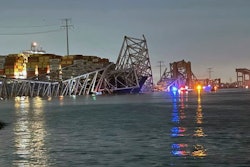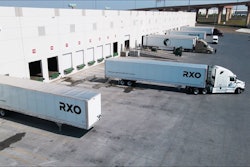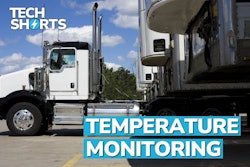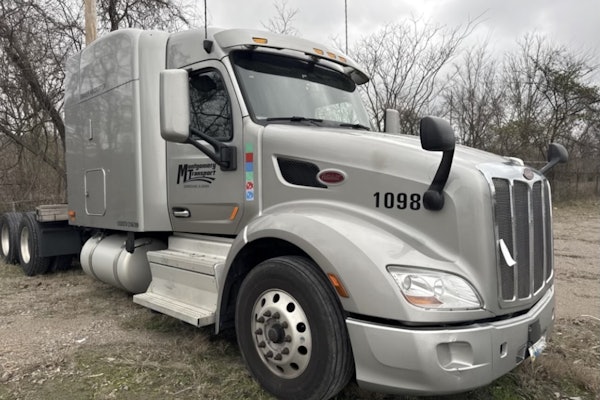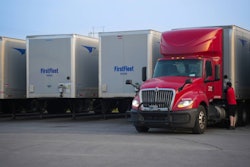Artificial Intelligence (AI) isn’t new in trucking. It’s been around for more than a decade, and its capabilities have only grown during that time. AI is used in trucking to help improve safety, efficiency, performance and more by helping people do their jobs better in many cases.
Joining Jason and Matt this week is Yoav Amiel, chief information officer at RXO, who talks about the advancements in AI within trucking and where it might eventually lead.
For more on RXO's AI-powered check-in system for trucks arriving at warehouses and distribution centers that Amiel talks about in the video, check out the March CCJ Innovators profile on RXO's new technology.
Contents of this video
00:00 10-44 intro
00:31 Artificial intelligence in trucking
02:04 AI and job efficiency
04:41 Streamlining check-in at warehouses and distribution centers
06:40 Evolution of AI in trucking
08:10 Benefits of AI in trucking
10:37 Drawbacks of using AI
13:55 The future of AI in trucking
Jason Cannon:
CCJ's 10-44 is brought to you by Chevron Delo heavy duty diesel engine oil. Now there's even more reasons to choose Delo.
Matt Cole:
Artificial intelligence has come a long way in trucking to help improve efficiencies. How much more can it help?
Jason Cannon:
You're watching CCJ's 10-44, a weekly episode that brings you the latest trucking industry news and updates from the editors of CCJ. Don't forget to subscribe and hit the bell for notifications so you'll never miss an installment of 10-44. Hey, everybody. Welcome back. I'm Jason Cannon and my co-host on the other side is Matt Cole. AI is not a new idea in trucking. It's been around for more than a decade, and over that time, its capabilities have only grown.
Matt Cole:
AI is used in trucking to help improve safety, efficiency, performance and more, by helping people do their jobs better in many cases. Joining us this week is Yoav Amiel, chief information officer at RXO, who talks about the advancements in AI within trucking and where it might eventually lead.
Yoav Amiel:
RXO is an asset light transportation company and it's a technology group. We build all the technologies that help the business grow over time. One of our biggest platforms that we have to drive transportation is called RXO Connect, and this platform in many ways sits on top of all the lines of business that we are serving, brokerage at the front, we have managed transportation, last mile and freight forwarding.
Now, this platform was built from the ground up, meaning that we had the luxury of building things in a microservices approach allowing us to build this innovation, and I know that today, we're going to focus a lot around AI and machine learning, and I think on that front, we've been practicing AI for more than a decade now. This is not new to us, but of course the more AI is evolving over time, we are progressing with that and making sure that we take advantage of all the new capabilities that are available for us.
Jason Cannon:
A lot of times when people think about AI and automation, they think it's a threat to their job, but Yoov says it really should be viewed as a supplement to help us do our jobs more efficiently.
Yoav Amiel:
AI, it's a science of making machines do things that would require let's call it a human-like intelligence. There are a lot of areas, techniques within the AI. Think about machine learning, deep learning, neural networks. A lot of progress is happening there, but it's important to know that it's not to replace the human intelligence. In many ways, it's to amplify our creativity and ability to complete tasks, and I look at it more of an augmented intelligence, for us to be able to be better and be able to spend our time in the most important task that we need to do.
Matt Cole:
RXO recently launched an AI driven system of its own to streamline the check-in process for trucks at warehouses and distribution centers. Yoav tells us how it works after a word from 10-44 sponsor, Chevron Lubricants.
Speaker 4:
These past few years have been less than easy. We've encountered challenges we never imagined we'd ever have to deal with, from makeshift home offices and video meetings to global supply chain uncertainty, price instability, market disruptions, and everything in between. Delivering the level of services and products our customers had come to expect was difficult for all of us. We can't change what's behind us, but we can definitely learn from it. We can adapt, evolve, and take steps to reset our thinking, adapt our strategies, and restore your trust in us to better meet your needs, now and in the future. That change begins today.
Today, we break with convention and introduce a rebalance line of Delo heavy duty engine oils. We've reduced our product line from four categories to two. Consolidated and simplified, this lineup removes complexity from the manufacturing processes, enhancing price stability and supply chain reliability so you can trust you'll have the premium products you need to keep your business always moving forward. Our break with convention optimizes the Delo lineup to allow you to provide your customers with the best synthetic blend and synthetic heavy duty engine oils in the market, fully available at prices you can rely on. It's your assurance that you'll be well positioned to be their trusted source for proven engine protection that keeps equipment on the job, giving your customers even more reasons to choose Delo.
Yoav Amiel:
When we build technology, we make sure that we build it to drive a business lever. We don't just build technology for the sake of technology, and we make sure that it ties to either productivity or volume or margins overall. In this case, this is a productivity type of an initiative and we saw that in our big warehouses and yards, there is a gate slowdowns when trucks are coming in. So we combine the already video that are coming from the gate, the CCTV that we have there, and apply the machine learning and AI capabilities to be able to extract the information of the truck and help the person at the gate to be more effective.
Instead of going through the track and writing down the number of the truck and the driver details on the piece of paper, going to the computer and typing that in, that actually allowed that person to be much more effective, and the moment a truck is coming and there is already an appointment in the system, it extracts the relevant information, able to match it to that appointment and make the whole process of checking in and getting into the yard much, much more efficient.
From our measurement or on average, they reduced about 30% of the wait time at the gate. And we get a lot of positive reactions from both, of course, the carriers and the operations at the gate, and we don't want to stop there. There are a lot of opportunities to even get efficiencies within the yard, leveraging drones and being able to understand what is going on instead of having a human trying to go through that. And of course when a human is involved, sometimes we make errors, and the moment you make an error, that creates more delays or challenges for the process. So leveraging these type of techniques, not just reducing the wait time, it reduces the error rate as well.
Jason Cannon:
AI and trucking has evolved considerably over the last decade, and Yoav says there are still a lot of gains to be made.
Yoav Amiel:
It started in the past by object recognition, image recognition, then it evolved into insights and system that came with recommendation like matching loads with carriers. And in today's world, I'm excited about things like task completion. I can just talk to you like let's talk about a futuristic state where a carrier can talk to a machine or type or whatever interface they want to interact with the machine, and say, "Book me a load for this week. I want to leave my facility Monday morning and I want to return by Friday, 5:00 PM." I don't know, maybe there is a birthday in the family or I want just to be there for dinner, and I want to spend one night in Chicago, and now just do it for me.
And the system will automatically find maybe multiple loads that can fit these requirements and of course the truck type and their certification that this specific driver have, and minimize the empty miles and maximize the revenue for the driver, and the driver does not or the carrier does not need to do anything. The system will automatically book the load, assign it to them, and this is the greatness. The way I look at AI and machine learning, it's a win-win type of a thing because everybody gets something out of it and we could focus most of our time in the things that we bring value as human beings to the surface.
Matt Cole:
Yoav says the biggest benefits trucking has seen as a result of AI are the efficiencies gained from automation, load matching and more.
Yoav Amiel:
Drilling down into the transportation industry, I think there are a lot of benefits. Of course, the first thing that comes to mind and the example that we just gave with the yard is efficiency and automation, but there are a lot of areas in the transportation industry like load matching which I refer to finding the right loads for the right carriers, route optimization, even warehouse workforce planning, and even document processing. In today's large language models, you could extract information from documents even if the document is not structured. We are actually using that at RXO as well. When a shipper is asking us for a quote via email in an unstructured format, we are using technology to be able to extract the request and even automatically send a quote to that shipper. So that's around automation.
Another benefit is of course it drives cost reduction, fuel, time on tasks, resource planning. As I mentioned, if you talk about warehouses, you don't want to find yourself that you have more workforce than what you really need to, so the moment you plan right, you could save a lot of costs.
The other benefit around AI and machine learning is around decision making, and I touched that a little bit earlier. That ability of a process to analyze massive, massive data sets, I'm not saying a human being cannot do that but that will take a long time. And helping that person to make a data-driven decision, that's a huge benefit of leveraging these machines. Overall, from customer service, think about personalization. The systems today are personalized. One user that logs into a system sees a different flavor of the system according to their behavior, past behavior or attributes or preferences. And the ability to provide a 24/7 support today, the gen AI is a big hype today and these bots that can help you with task completion and provide a self-service, a 24/7 self-service capability, this is a huge, huge benefit that we gain from this type of engine.
Jason Cannon:
While there are plenty of benefits to using AI, there are also drawbacks that include security over-reliance and a lot more.
Yoav Amiel:
The drawbacks are very, I would say, similar to any other area, but I can call out a few. So of course, the first one is around security. At the moment, you have AI engines and machine learning. You have a lot of data concentrated in one place, and then you could start having areas of data privacy and overall bad actors that may be trying to misuse this information. In addition, what we see today, that the bad actors are becoming more sophisticated. They themselves are leveraging AI and machine learning to try and trick the user in order to gain access to specific areas. So we need to be smarter and smarter over time to make sure that from a security perspective and a privacy perspective, we are protecting ourselves and protecting the data.
An area of AI which is a concern or an area we need to pay attention to is the fairness of AI or the bias that could be embedded within the data. A lot of engines rely on the data on the internet, and the data on the internet could be biased, and AI, the data you feed the engine, they learn from that and they could actually build bias within their recommendation. So we need to build a mechanism, and I know maybe it's funny to mention that it could be a machine learning mechanism that looks at the results of the AI engine and flag areas where things seem biased towards one specific group or one specific type of actions.
There is another area where I mentioned that around explainability. In today's world, we create that dependency on machines, so one, of course we need to make sure that we have the processes and mechanisms to be able to proceed, even if from some reason, the computer or the system stopped. And you think about autonomous trucks and areas like that, what happens if the computer from some reason is not functioning? You need the ability to know how to drive the car or to take control from remote and be able to address the situation by maybe stopping on the sidelines or doing anything like that.
But going to the black box type of approach is that we create that dependency from whatever the system recommends us or serves to us, we consider that as probably the best thing or we consider that as the truth. And in today, there is an effort to build explainable AI, it's called XAI, where the engines bring together with the results, they provide the reasoning behind it. So you could say, oh, you recommend this thing but these are the reasons why, because you did that in the past, because other let's say carriers like you optimized for this specific route. Having that explainability will allow us not just to understand what is going on, but even to be able to flag anything that is not necessarily relying on the right information.
Matt Cole:
Like it has over the last decade, AI will continue to grow over the next decade and beyond. What will that look like in trucking?
Yoav Amiel:
First, of course, there are use cases that we are not even aware of and we cannot even dream of, but the thing that we could see in front of us, I would say one is autonomous trucks and autonomous self-driving trucks and vehicles and even flying vehicles. You could think about drones delivering packages or even taking passengers on a vertical liftoff and landing. In addition, of course there is what is referred to as the connected infrastructure. The moment we'll get to a point that all the things, let's say driving on the road, will be connected together. If you think about even traffic lights and all the indications that are coming from the roads themselves, you could build a much more efficient transportation platform where vehicles will drive on this infrastructure in a much smoother way and allow the decision making and dynamically adjusting.
Thinking about traffic lights or anything like that. You could dynamically adjust that to the trucks or vehicles on the road and minimize even accidents. From a safety perspective, connected infrastructure will have a huge, huge impact on the transportation overall. From a safety perspective, I mentioned a little bit about the connected infrastructure, but you could think about the inside the vehicle as well, distracted drivers or drunk drivers. Even monitoring the vehicle health, being able to understand that something is about to break and make sure that you provide enough time for alerts, so you could even predict maintenance that could save money and make sure that all the vehicles on the road are in a safe state, again, minimizing any accidents or unplanned type of activities.
Jason Cannon:
That's it for this week's 10-44. You can read more on ccjdigital.com. While you're there, sign up for our newsletter and stay up to date on the latest in trucking industry news and trends. If you have any questions or feedback, please let us know in the comments below. Don't forget to subscribe and hit the bell for notifications so you can catch us again next week.

